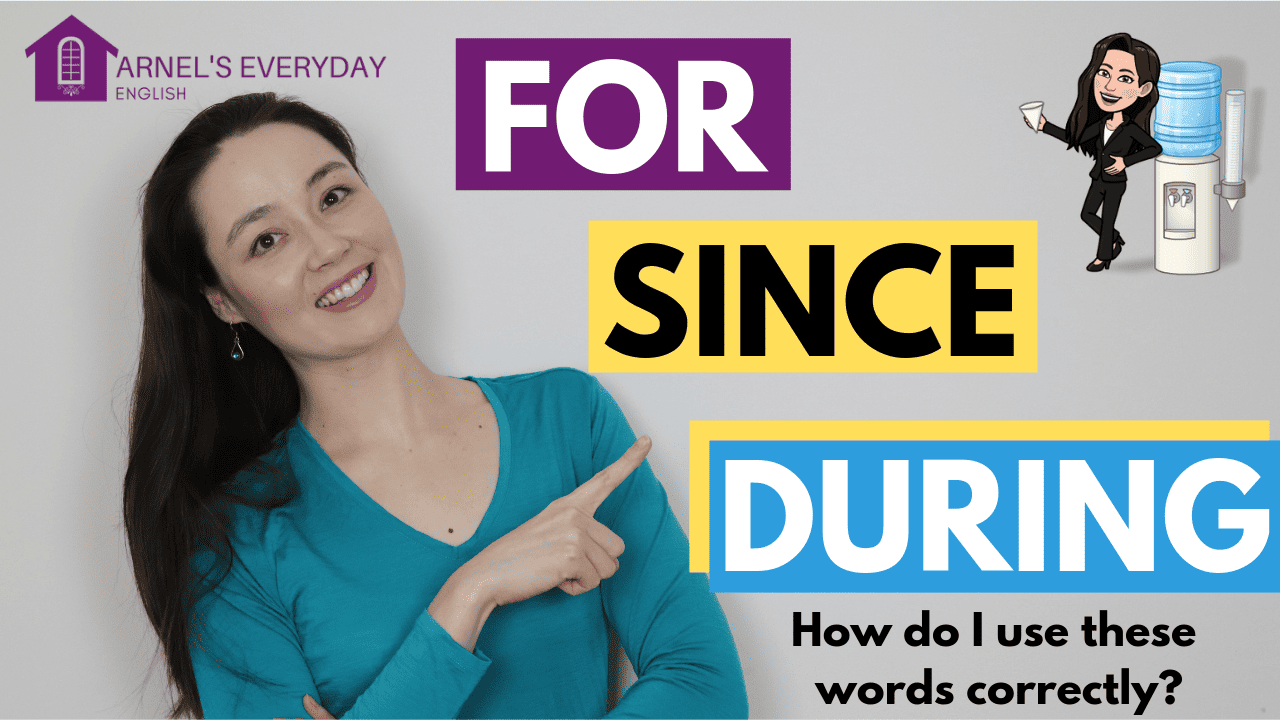Hi English learners! Welcome to today’s grammar lesson/blog on how to use for, since and during.
When do we use FOR, SINCE, DURING?
What is the DIFFERENCE?
In English, FOR and SINCE can have many different uses. Today, we are focusing on TIME.
Let’s look at this in 5 simple steps:
-
FOR
-
SINCE
-
comparing ‘for’ and ‘since’
-
DURING
-
typical mistakes
If you are a more visual learner, watch my video on For Since During!
We use FOR + length of time.
What is ‘length’?
LENGTH = noun
LONG = adjective
This snake is very long. / This snake is about 1 metre in length.
(The G in ‘length’ is silent.)
20 minutes = length of time
five hours = length of time
I brush my teeth for two minutes every day in the morning and in the evening.
Every morning I run on the treadmill for 45 minutes.
I’ve lived in this flat for six years.
Pete and I have been married for eight years.
A number such as 20, five, two, etc. isn’t necessary. We can also use a time phrase.
I’ll be staying at my sister’s house for a couple of nights.
I was stuck in traffic for ages.
My stomach hasn’t been feeling well for a few days actually.
Boss: Excuse me Sally, for the next few hours, I don’t want anyone to disturb me
Secretary: Okay, no problem. I’ll let everyone know that you are busy.
SINCE + start of time
We use ‘since’ to say when an action started.
I’ve been using this phone since 2017.
2017 is the starting point.
My family has owned this restaurant since 1995.
1995 is the starting point.
I haven’t eaten since 7 AM.
7 AM is my starting point.
This road has been closed since the 9th of March.
The 9th of March is my starting point.
A number such as 2017, 1995, 7 etc. is not necessary. We can also use a time phrase.
I have been wearing glasses since I was 7.
‘I was 7’ is my starting point.
My new colleague Kyle has been complaining since his first day.
‘His first day’, is the starting point.
I haven’t met very many people since I moved here.
‘I moved here’ is the starting point.
COMPARISON
For + length / Since + start of time
I’ve had my pet bird, Ben, for six years. / I’ve had Ben since 2013.
The information is the same. The grammar is different.
I’ve been waiting for 30 minutes. / I’ve been waiting since 9 AM.
The information is the same. The grammar is different.
I haven’t seen George for about a decade. / I haven’t seen George since graduation.
The information is the same. The grammar is different.
You can use FOR with any tense.
Examples:
- Present Simple: I usually brush my teeth for 5 minutes every day.
- Present Continuous: Tonight I’m working for 8 hours. (future meaning)
- Present Perfect: I’ve lived in Bristol for 10 months.
- Present Perfect Continuous: I’ve been waiting for over 30 minutes!
- Past Simple: I lived with an English family for 3 months in 2010.
- Past Continuous: The buffet was amazing. We were eating for 2 hours before someone told us we had to leave.
- Past Perfect: My boyfriend finally bought me a dog. I had wanted one for years.
- Past Perfect Continuous: I took my baby daughter to see a doctor because she had been crying for days non-stop.
- Future Simple*: The solar eclipse will last for 30 seconds.
- Future Continuous: I’ll be interviewing candidates for the next hour.
- Future Perfect: By 2025, I will have had my house for 32 years.
- Future Perfect Continuous: Next week, I’ll have been working for 8 days before you arrive on the project. I can help you catch up on everything.
* There are a variety of future forms! FOR can also be used with modal verbs.
⇒ We use SINCE with perfect tenses.
DURING + a set period
What is a set period?
The start and end time are clear.
During the exam, you cannot speak.
The exam is a set period from 10 AM – 1 PM.
I usually work as a lifeguard during the summer.
Summer is a set period. June – September
She kept talking to me during the film.
The film is a set period. 2 hours.
My grandfather was a Lieutenant during the 2nd World War.
The 2nd World War is a set period. 1939 – 1945.
I really wanted to go home during my lunch break.
My lunch break is a set period. 12:00 – 12: 45
Typical mistakes
Using ‘during’ + a length of time.
I had to wait during two hours.
☑I had to wait for two hours.
Using ‘since’ + length of time
I’ve been living in London since six months.
☑I’ve been living in London for six months.
Using ‘since’ + an unnatural tense
I’m waiting since 8 AM.
☑I’ve been waiting since 8 AM.
Remember, we normally use ‘since’ with perfect tenses.








